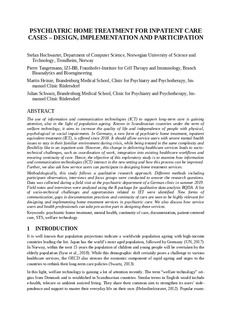Psychiatric Home Treatment for Inpatient Care - Design, Implementation and Participation
Journal article, Peer reviewed
Published version

Åpne
Permanent lenke
http://hdl.handle.net/11250/2629770Utgivelsesdato
2019Metadata
Vis full innførselSamlinger
Originalversjon
NOKOBIT - Norsk konferanse for organisasjoners bruk av informasjonsteknologi. 2019, 27 (1), .Sammendrag
The use of information and communication technologies (ICT) to support long-term care is gaining attention, also in the light of population ageing. Known in Scandinavian countries under the term of welfare technology, it aims to increase the quality of life and independence of people with physical, psychological or social impairments. In Germany, a new form of psychiatric home treatment, inpatient equivalent treatment (IET), is offered since 2018. It should allow service users with severe mental health issues to stay in their familiar environment during crisis, while being treated in the same complexity and flexibility like in an inpatient unit. However, this change in delivering healthcare services leads to sociotechnical challenges, such as coordination of work, integration into existing healthcare workflows and ensuring continuity of care. Hence, the objective of this exploratory study is to examine how information and communication technologies (ICT) interact in the new setting and how this process can be improved. Further, we also ask how service users can participate in designing home treatment services. Methodologically, this study follows a qualitative research approach. Different methods including participant observation, interviews and focus groups were conducted to answer the research questions. Data was collected during a field visit at the psychiatric department of a German clinic in summer 2019. Field notes and interviews were analyzed using the R package for qualitative data analysis RQDA. A list of socio-technical challenges and opportunities related to IET were identified. New forms of communication, gaps in documentation practices and continuity of care are seen to be highly relevant for designing and implementing home treatment services in psychiatric care. We also discuss how service users and health professionals can take pro-active part in designing these services.